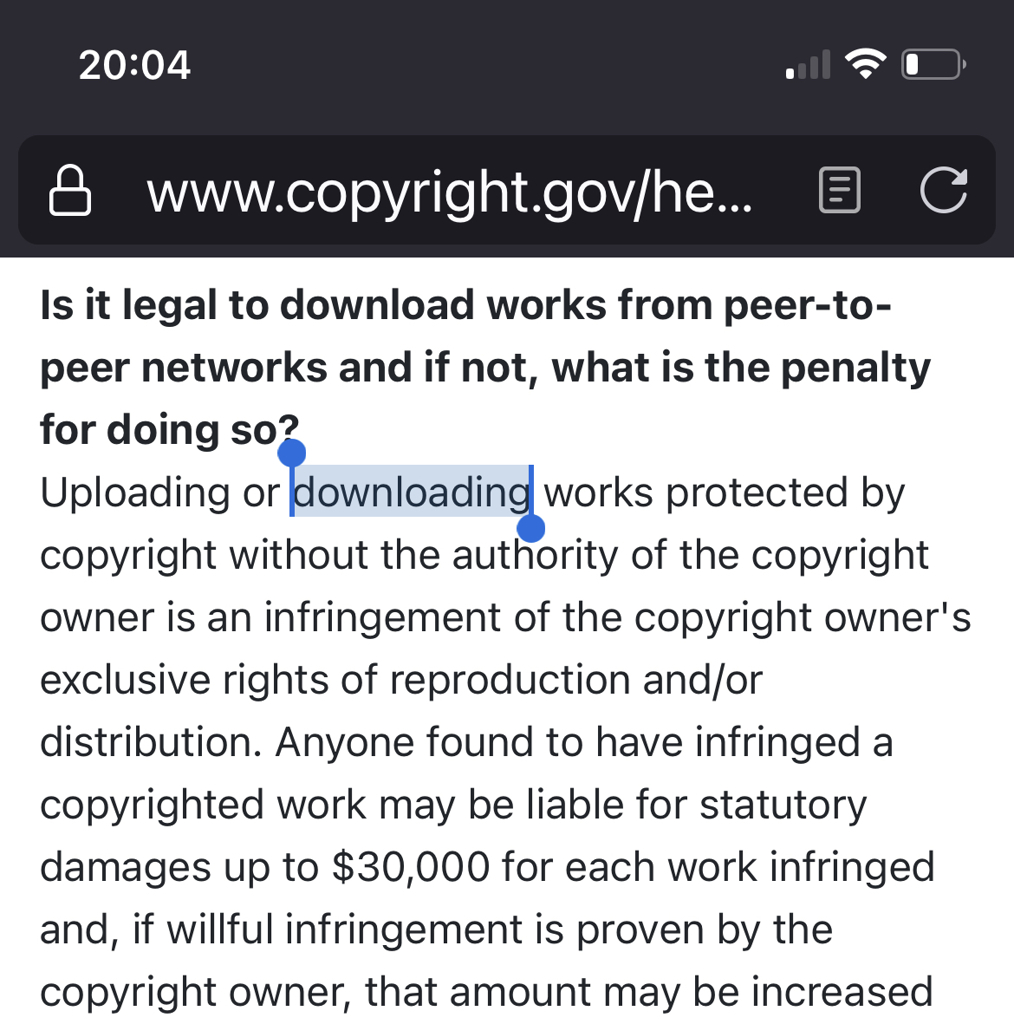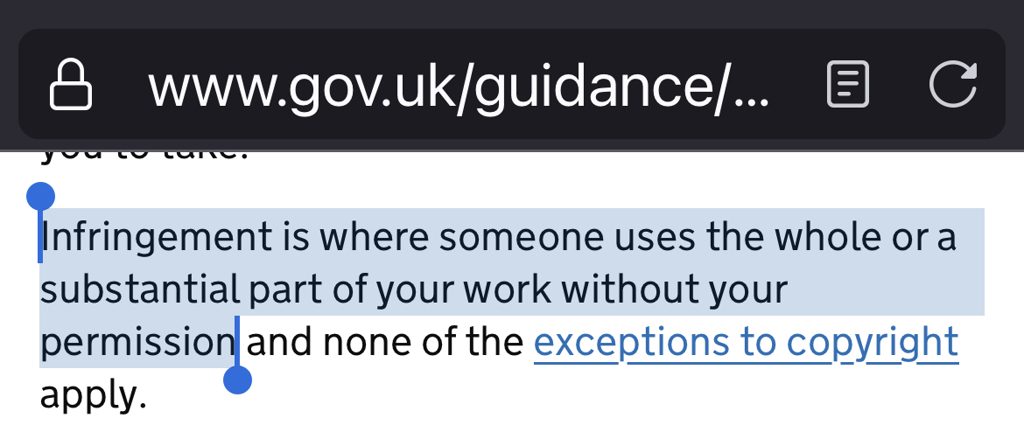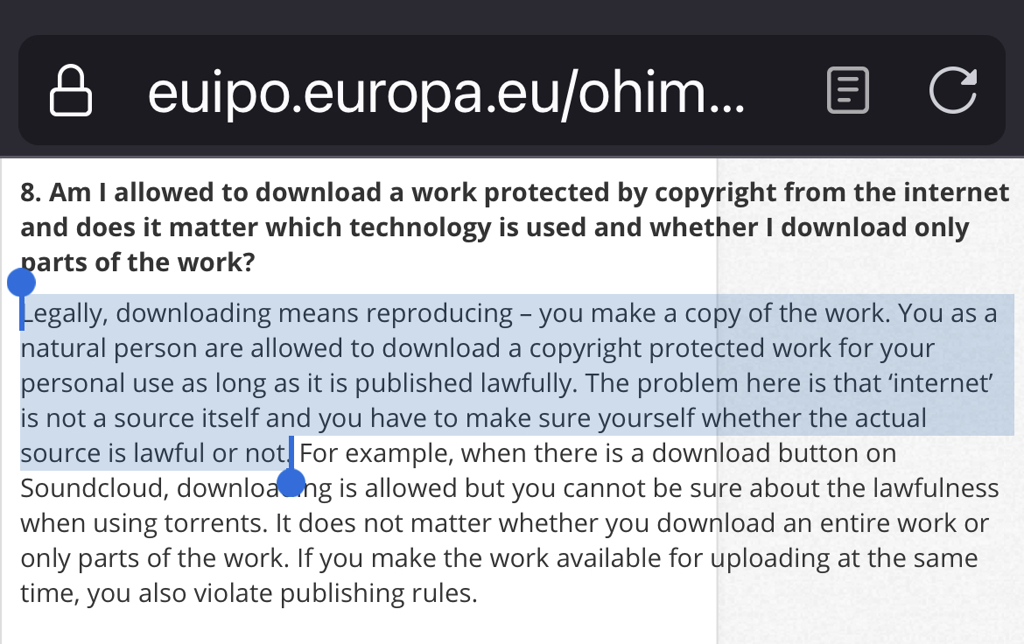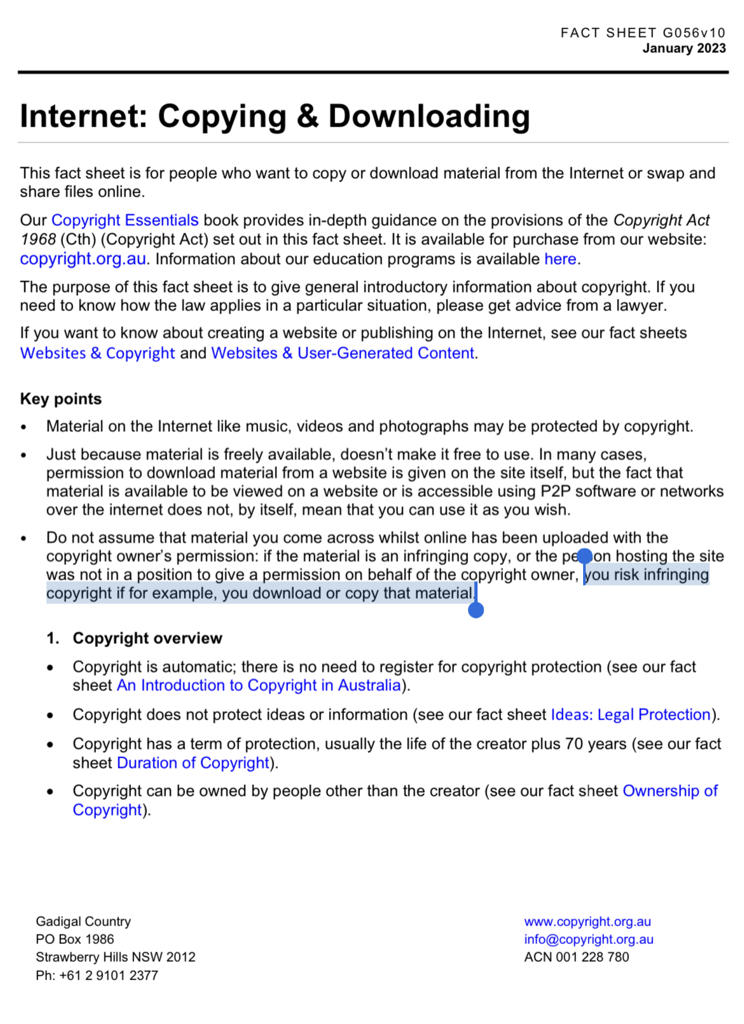view the rest of the comments
Technology
This is the official technology community of Lemmy.ml for all news related to creation and use of technology, and to facilitate civil, meaningful discussion around it.
Ask in DM before posting product reviews or ads. All such posts otherwise are subject to removal.
Rules:
1: All Lemmy rules apply
2: Do not post low effort posts
3: NEVER post naziped*gore stuff
4: Always post article URLs or their archived version URLs as sources, NOT screenshots. Help the blind users.
5: personal rants of Big Tech CEOs like Elon Musk are unwelcome (does not include posts about their companies affecting wide range of people)
6: no advertisement posts unless verified as legitimate and non-exploitative/non-consumerist
7: crypto related posts, unless essential, are disallowed
They've got a point.
If you ask AI to summarize something, it needs to know what it's summarizing. Reading other summaries might be legal, but then why not just read those summaries first?
If the AI "reads" the work first, then it would have needed to pay for it. And how do you deal with that? Is a chatbot treated like one user? Or does it need to pay for a copy for each human that asks for a summary?
I think if they'd have paid for a single ebbok Library subscription they'd be fine. However the article says they used pirate libraries so it could read anything on the fly.
Pointing an AI at pirated media is going to be hard to defend in court. And a class action full of authors and celebrities isn't going to be a cakewalk. They've got a lot of money to fight, and have lots of contacts for copyright laws. I'm sure all the publishers are pissed too.
Everyone is going after AI money these days, this seems like the rare case where it's justified
That's not actually true. Copyright applies to distribution, not consumption. You violate no law when I create an unauthorized copy of a work, and you read that copy. Copyright law prohibits you from distributing further copies, but it does not prohibit you from possessing the copy I provided you, nor are you prohibited from speaking about the copy you have acquired.
Unless the AI is regurgitating substantial parts of the original work, it's output is a "transformative derivation", which is not subject to the protections of the original copyright. The AI is doing what English teachers ask of every school-age child: create a book report.
The US copyright office says this on their website
If the company downloaded books without buying them to train their AI, that's copyright infringement
Their website has zero legal precedence. It is an oversimplification that does not stand up to scrutiny.
The combined act of transmitting the work from uploader to downloader is infringing, but only the uploader's actions conflict with copyright law. The downloader's actions do not.
This is completely untrue. Making any unauthorised copy is an infringement of copyright. Hell, the UK determined that merely loading a pirated game into RAM was unauthorised copying, making the act of playing a pirated game unlawful - thankfully this is ruling only the case in the UK, however the basic principles of copyright are the same all over the world.
When you buy something, you get a limited license to make copies for the purpose of viewing the material. That license does not extend to making backup copies. However, in a practical sense, it is very unlikely you will be prosecuted for most kinds of infringement like this - particularly when no money is involved. It's still infringement, though.
Edit: I will say though: you violate no law when you view a copy I create. However I would still be infringing for making and showing you the copy.
In the case of making a book report, that is educational, and thus fair use. ChatGPT is not educational - you might use it for education, but ChatGPT's use of copyrighted material is for commercial enterprise.
The uploader is the person creating the copy. Downloading is not creating a copy; downloading is receiving a copy.
I would love to see a citation on that UK precedent, but as you said: "thankfully this is only the case in the UK" and does not apply in the rest of the world.
The exceptions to that are so numerous that the statement is closer to false than truth. "Fair Use" blows the absolute nature of that statement out of the water.
There has never been a successful prosecution for downloading only.
Every single transfer of data is a copy. There is no such thing as moving data. Only copying it and then voluntarily deleting the original, to fake it having "moved"
Every single transmission of data is a copy. Receiving data is not. The person creating the copy is the sender, not the receiver.
eh it gets fuzzy. the sender transmits, but the receiver also writes a copy. it gets copied to the wire, and it gets copied from the wire. there is an ephemeral intermediate copy "on the wire". I guess there's no right answer; it's like a fractal, the answer keeps changing when you look deeper
Got a Ring doorbell? A security camera? If I walk up to your camera and start playing a copyrighted work, have you infringed on copyright? Of course not. The recording you saved now contains a copy of the work, but you were privileged in recording at the time.
That doesn't change when you ask me to come "send" that work to your camera. You are free to ask for something that I am not obligated to provide. If I choose to provide it, I am the infringing party, not you.
Downloading is no different. You ask me to use a specific protocol to send a specific work to a specific port at a specific address. I can choose to do that, or I can tell you to pound sand. If I choose to send it, I am the infringing party, not you.
The specific processes applied by the computer to save and replay the work would not qualify as "copying" under copyright law. If they did, viewing any copyrighted work would be an infringement, as the computer uses those same processes to view legitimate copies as illegitimate.
We're not talking about fair use though - which also is incredibly limited. It only applies to education, news or criticism. Fair use would be an authorised copy, by definition.
The specific ruling does not apply to the rest of the world, so there is no established precedent elsewhere that playing a pirated video game is an offense. This just means someone wishing to prosecute this offense would have no case law to back up their claim. However the principle that led to the ruling is the same - you need a license to make a copy (except for fair use, which as I say would rarely apply) and computers copy files internally in order to display their content.
One person is providing a copy to someone else - that person is infringing copyright - and the person receiving is writing a copy to their device, and furthermore needs to make copies to display the content - that person is also infringing copyright.
You can't open a file like you would a book. You need to copy and process the file in order to display it.
There have been no prosecutions for downloading only because the level of damages is so low that it isn't worth the cost of going to court. That doesn't make it less illegal, it's just more likely you'll get away with it.
That precedent has never been set in the US. The "process" you're talking about for a human to open a digital book is not considered "copying" under US law.
That is a theory. Not a very compelling one, given the level of pettiness we regularly see in the courts. The precedent of a successful prosecution for downloading would be extremely valuable to rights holders: it would have a chilling effect on the entire community of pirates. The reverse is also true: a failed prosecution would lend a great deal of legitimacy to piracy for personal consumption.
The actual reason why rights holders aren't pressing cases against downloaders is because they know they will fail. Copyright law is not written or interpreted in such a way as to enable prosecution of people for receiving a work, or even for requesting a work be sent to them. Copyright law envisions pirate distributors, not consumers.
There was still copyright infringement because the company probably downloaded the text (which created another copy) and modified it (alteration is also protected by copyright) before using it as training data. If you write an original novel and admit that you had pirated a bunch of novels to use for reference, those novels were still downloaded illegally even if you've deleted them by now. The AI isn't copyright infringement itself, it's proof that copyright infringement has happened.
But personally I don't think the actual laws will matter so much as which side has the better case for why they will lead to more innovation and growth for the economy.
Sure, someone likely infringed on copyright for that copy to be created, but the person/entity committing that infringement is the sender, not the receiver. The uploader is the infringing party, not the downloader.
They were uploaded illegally. The people who distributed those copies to me have infringed on copyright, sure. My receiving those copies does not constitute infringement. Uploading is the illegal act, not downloading.
My work does not violate copyright, unless I use a substantial part of the other works. But, if I used substantial parts of those works, my work would be some sort of "derivation" and not the "original novel" you declared it. (Many types of derivation fall within "fair use" and do not constitute infringement.)
Whether I delete the works or not is entirely irrelevant. I am prohibited from creating and distributing additional copies, but I am not prohibited from receiving, possessing, or consuming an unauthorized copy.
an exclusive right of the copyright holder is the right to duplicate their work. downloading IS illegal because you're creating an unauthorized duplicate of the work on your machine. your duplicate is distinct from the duplicate that someone else had created and uploaded. it's just very hard to get caught downloading, and it's not very cost effective for companies to pursue since they would only stop one person. that's why most companies like the RIAA targeted torrents for their lawsuits, because they could easily see the ip addresses (which is why you should always use a vpn when torrenting) and because they could shut down uploaders. but downloading itself is still very illegal
like I said, the AI is not a violation (probably, unless the courts later disagree), it's proof that unauthorized duplication of copyrighted works has occurred, and that is illegal
You cannot create a copy of a work that you do not possess. The downloader does not possess the work to create a copy. Only the uploader is even capable of creating the copy. The downloader cannot create a copy; he can only request.
If he does something else with that copy he receives, he becomes something other than merely a downloader. That "something else" could be unlawful, but that "something else" is not "downloading".
It could be unlawful if the downloader gains unauthorized access to the computer system, but that would not be a copyright violation. It could be unlawful if the downloader conspires with the uploader, but the degree of collaboration would have to be much greater to support a conspiracy charge.
Downloading does not meet the statutory criteria for copyright infringement. Downloading alone is not infringement.
US
UK
EU
Australia cuz why the hell not
Can the sources where ChatGPT got it's information from be traced? What if it got the information from other summaries?
I think the hardest thing for these companies will be validating the information their AI is using. I can see an encyclopedia-like industry popping up over the next couple years.
Btw I know very little about this topic but I find it fascinating
Yes! They publish the data sources and where they got everything from. Diffusers (stable diffusion/midjoirny etc) and GPT both use tons of data that was taken in ways that likely violate that data’s usage agreement.
Imo they deserve whatever lawsuits they have coming.
It doesn't seem to be too common for books to include specific clauses or EULAs that prohibit their use as data in machine learning systems. I'm curious if there are really any aspects that cover this without it being explicitly mentioned. I guess we'll find out.
I think with a book your standard digital license / copyright would forbid it, would it not?
Maybe. I'm interested in the specifics.
It depends on if the summary is an infringing derivative work, doesn't it? Wikipedia is full of summaries, for example, and it's not violating copyright.
If they illegally downloaded the works, that feels like a standalone issue to me, not having anything to do with AI.
Wikipedia is a non profit whose primary purpose is education. ChatGPT is a business venture.
A book review published in a newspaper is a commercial venture for the purpose of selling ads. The commercial aspect doesn't make the review an infringement.
A summary is a "Transformative Derivation". It is a related work, created for a fundamentally different purpose. It is a discussion about the work, not a copy of the work. Transformative derivations are not infringements, even where they are specifically intended to be used for commercial purposes.
A book review is most likely critical, and thus falls under fair use.
A summary is not critical, so would not have a fair use exemption. I would also disagree that it is transformative. That argument is about work that is so different to the original that it must be considered a separate piece (eg new music that uses a sample from old music). A summary is inherently not transformative, because it is merely a shortened version of the original - the ideas expressed are the same.
Transformative doesn't mean that the idea is different. It means the purpose for expressing the idea is different. Informing an individual or the general public of the general idea presented in a book is not an infringement. If it were, every book report every student is ever asked to write would be an infringement.
https://en.m.wikipedia.org/wiki/Transformative_use
A summary would not place the original work in a new light. A summary is the same work but shorter. A summary would be infringement.
Student book reports are for educational purposes, which has its own specific exemption under fair use. As does work which is critical of the original, along with news. A critical piece, for example, is transformative because it introduces new ideas, talking about the work and framing it in new ways.
AI meets none of these exemptions with a summary. It's debatable whether it even could meet these exemptions in the way that it functions.
You're forgetting two other important categories of fair use. Paste that student's book report in a newspaper, and it is no longer "educational", but it is still "news reporting". "Author publishes work" is a newsworthy event.
Paste it in response to an individual asking about the work, and again, it is no longer educational, but it is still "commentary", which is much the same as news reporting but with a typically smaller audience.
Even if these two categories of fair use were not specifically included in copyright law, they would naturally arises from the right to free speech. Making a summary subject to the original copyright would make it unlawful for anyone to even discuss the work at all.
You're really stretching to try and make your arguments seem correct.
Nah, rightsholder organizations have been spreading their FUD propaganda since the advent of the cassette tape and VHS. They have tried, but they have never won a case against someone solely for receiving and saving a work. Downloading is not a crime in and of itself. The criminal act is uploading.
None of it is a crime unless you're doing it for profit - commercial copyright infringement. Regular copyright infringement is a civil offense, which is why it's up to the rightsholder to prosecute a claim. Any claim will have cost but also uncertainty, hence why if the value of the claim is low they won't bother - even if the case is strong - to avoid the risk of losing over some small procedural matter. Also typically in the US you don't get awarded costs, so if your claim isn't going to meet your costs it will always be a net loss.
Downloading most definitely is the civil offense of copyright infringement. It's just not worth prosecuting - the most they could claim for is the cost of a single download, which is far less than the cost of going to court.
To argue otherwise is to claim you can legally take whatever you like without paying for it.
Do you not understand the fundamental purpose of copyright law? It is not to ensure that artists get paid. The purpose is "To promote the progress of science and useful arts". The purpose is to expand the depth and breadth of public knowledge; to push ideas into the public domain, where they can be used by anyone.
You're getting so hung up on the method of copyright that you're ignoring its purpose. Yes, you can legally receive whatever you like without paying for it. The trick is in finding someone willing to send it to you. That sender might be prohibited from sending it, and you might be prohibited from sending it to others, but there is nothing in copyright law that prohibits you from receiving it.
The value of winning a single case of infringement against a downloader is the precedent it sets. The costs associated with that first case are miniscule relative to the benefits. Winning that first case would allow rightsholders to truly annihilate P2P platforms. With that one case as precedent, they could credibly demand billions in settlements from the American public.
No, that "not worth the cost to prosecute" claim is complete and total horseshit. The reality is that every time they have tried to target downloaders, their cases have been dismissed long before going to trial, because they can't show how a downloader runs afoul of copyright law. The law targets distribution, not reception.
A quick search provides plenty of links to say you're wrong. In particular with respect to downloading from the internet, which is significantly different to receiving a physical item.
When you download, you create a copy on your computer. You read a file from a server, then write it to your local storage.
Sure, maybe buying a pirated CD may be legal for the buyer, but copying that CD would not be - and like I say, there is the argument that playing the CD is a form of copying that is only permitted with a license from the rightsholder. However downloading is regarded as a form of copying that is only permissible with permission from the rightsholder.
You are trying to justify something that no reasonable person - let alone a court - would justify.
None of those links are to federal statutes. Some are to government sites, but not to the statutes. The statutes do not support your claims.
VHS and cassette recordings of broadcast or pirate transmissions also end up with a copy of the work in the possession of the receiver. Both are legal. It is not legal to share or retransmit those recordings, but those recordings are themselves legal to create and consume.
No. You're radically oversimplifying the scenario. You're ignoring the second party involved.
P2P downloading is like calling up a pirate radio station and asking them to play a song. You set up your recording device, and wait for them to play it.. The recording you make is legal. The act of requesting the song does not obligate the station to play it. They can ignore your request, or play it immediately, or play it three nights later. Their choice to play it is theirs alone. Their playing it is the infringement.
P2P downloading, your computer sends a request to the server. Depending on how the server is configured by the uploader and the resources available to it, it may or may not begin sending the requested work.